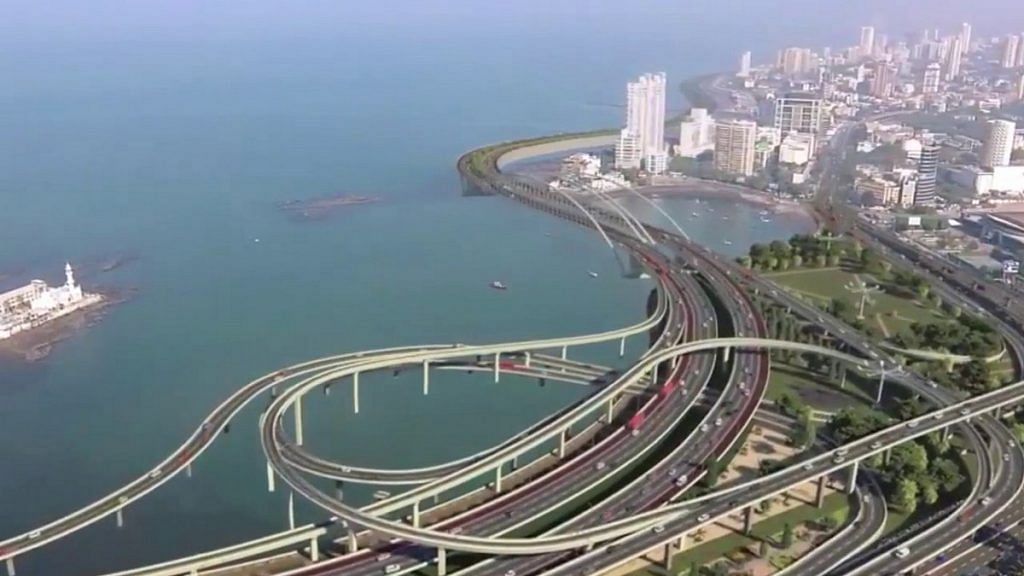New Delhi: Developing countries cannot be told to stop their projects only because they are likely to cause climate change, the Supreme Court remarked Friday, as it modified its two-year-old order to allow the Municipal Corporation of Greater Mumbai to commence partial development work in the ongoing Mumbai Coastal Road Project.
A bench of justices D.Y. Chandrachud and Hima Kohli allowed the corporation’s application to amend the apex court’s October 2020 order which permitted the civic body to reclaim sea land strictly for the purpose of road construction.
The SC order had come on a pending appeal filed by the corporation against the Bombay High Court’s July 2019 judgement that stalled the coastal road project due to lack of adequate environmental clearances.
Though the top court had in December 2019 stayed the HC verdict, it refused to allow the corporation to move on with the project in totality and restricted it only to the road construction part. This was reiterated in October 2020 by the bench led by then Chief Justice of India S.A. Bobde. The matter, however, had not been heard since then.
One of the lawyers, appearing for the corporation, told ThePrint: “Road construction work has been in full swing since the top court’s [earlier] order. But the corporation felt that other development works should be taken up to save time and escalation of costs.”
Also Read: Why Denmark is offering $13 mn in ‘loss & damages’ climate funding to developing countries
‘Pollution also by developed countries’
On Friday, while giving the go-ahead for the allied development work, the top court brushed aside objections raised by those opposing the project on the ground that it would lead to climate change and block tidal waters.
“Only developing countries do not contribute to climate change. Climate change is due to the pollution brought in by developed countries. To say, now, that developing countries must stop their projects would be wrong,” the bench told senior counsel Colin Gonsalves, who was representing an non-government organisation (NGO).
The NGO is opposing the civic body’s request to allow it to carry out development work and road construction simultaneously.
When Gonsalves attempted to highlight what he described as the fallout of the development work on ecology and the “sensitive wildlife area”, the bench pondered if it was in the court’s remit to decide whether such projects should be stopped only because of “climate change”.
“It is the question of civilisation. How can we say India should remain frozen, that rural areas must remain rural? If we need to remove poverty, it requires greater urbanisation. How can the courts step in and say because of climate change we will not allow,” Justice Chandrachud asked Gonsalves.
The judge noted that the corporation had specifically mentioned that no commercial development work would happen.
According to the latest order, the corporation can now lay out gardens in spaces and parks abutting the road, start work on a cycle and jogging track, initiate steps to provide landscaping of the seaside promenade and road median, create recreation spaces and start a butterfly park. For now, the court has not allowed construction of an amusement park.
The top court also gave the go-ahead to the corporation to begin development work — specified in its application — on the underground car-parking facility in Haji Ali area.
All these activities would, however, be subject to certain undertakings by the municipal corporation, it said.
These include an assurance to adhere to the conditions laid out in the regulations for coastal zones, not to use the reclaimed land for any other residential and commercial development, and to take permission before reclaiming land in coastal zone in the future.
The Rs 14,000-crore Mumbai Coastal Road Project comprises 10 km of bridges on stilts, a tunnel and a road segment between Marine Drive and Worli. The road is part of a larger proposal to have uninterrupted 30-km connectivity between South Mumbai and Kandivali. It is expected to cut road travel between the city’s ends to under half an hour.
In its appeal before the SC, the municipal corporation has claimed that construction of a coastal road on reclaimed land has been part of the development plan for Mumbai since 1967, and that it would be cheaper than construction of a sea link along the same route.
(Edited by Nida Fatima Siddiqui)
Also Read: ‘Urban Naxals stalled Narmada project’, Modi tells environment ministers, urges faster clearances
